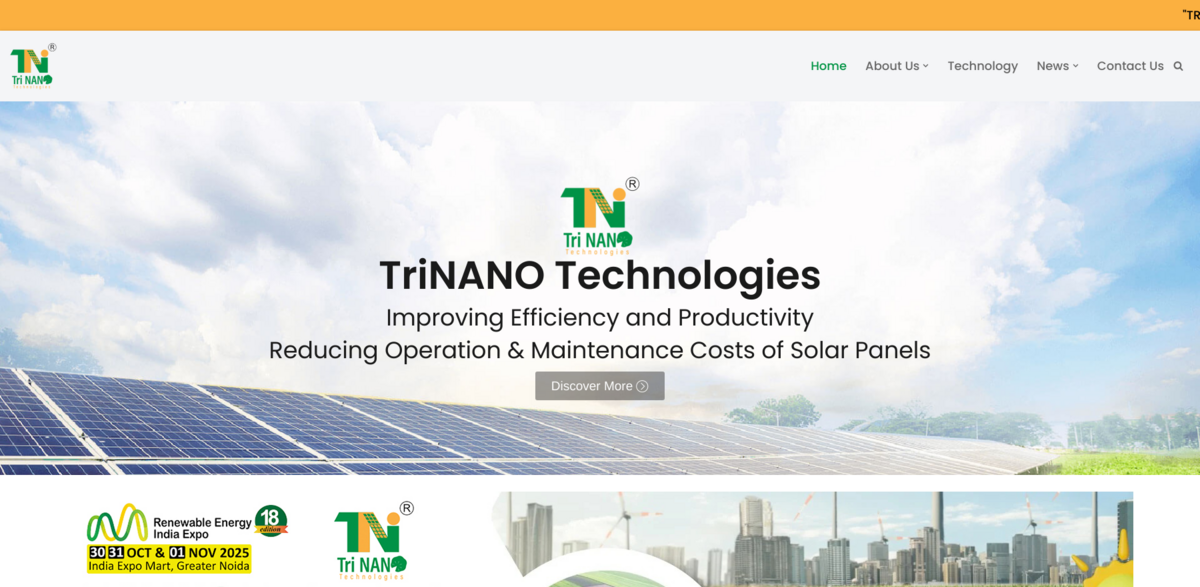What is TriNANO Technologies’ Solar Panel Nano Coating?
TriNANO Technologies Pvt. Ltd., founded in 2022 in Navi Mumbai, Maharashtra, is revolutionizing solar energy with its cutting-edge nano coating technology. Their research team, a blend of academia and industry experts, has been honing this innovation since 2018. The core of their offering? A super-thin, 0.4 micron nano coating applied to the glass surface of solar panels that boosts performance, cuts down maintenance, and extends panel life. This isn’t just any coating—it’s a solid-state, inorganic/ceramic/oxide layer applied through an electro deposition process, designed with three main properties: light trapping, self-cleaning, and anti-reflection.
Main Benefits of TriNANO’s Nano Coating
The technology packs a punch when it comes to improving solar panel efficiency and sustainability. Here are some key figures and facts:
- Performance boost: Approximately 10%+ increase in power output from day one.
- Energy output increase: About 4% more energy generated overall.
- Extended panel life: Adds roughly 2 to 3 years to the lifespan of solar panels.
- Reduced cleaning needs: Cuts cleaning frequency by around 55%, thanks to its self-cleaning properties.
- Environmental impact: Lowers water consumption for cleaning by 55% and decreases carbon emissions by 5.2%.
How Does the Nano Coating Work?
TriNANO’s coating is inspired by nature—specifically, the moth-eye structure and the lotus leaf’s self-cleaning ability. The moth-eye-inspired antireflective surface is created by combining tiny fibers that reduce sunlight reflection, meaning more light stays on the panel’s surface to generate electricity. Normally, about half the sunlight passes right through thin solar cells without contributing to power generation. This coating traps that light, directing it to the underlying silica cells for better efficiency.
Self-Cleaning Magic: Nature’s Influence
Imagine how a drop of water rolls off a lotus leaf, effortlessly cleaning its surface. That’s exactly what TriNANO’s coating does for solar panels. The low surface tension repels water, which then washes away dust, oil, grime, and even bird droppings. This means panels stay cleaner longer and require less manual maintenance—just a soft brush, high-pressure air, or a bit of rain can do the trick.
Unique Microstructure and Application Process
The coating’s microstructure mimics the Amazon raintree forest, increasing the surface area on the glass of solar panels. This intricate design traps light more effectively and prevents dirt particles from sticking. Applied through an electro deposition process, the coating is thinner than a human hair but mighty in its impact. It works on every solar panel, no matter the make, type, age, or location—making it a versatile solution for improving solar power generation worldwide.
Project Impact: Sustainable Development Goals (SDGs) Linked to TriNANO’s Technology
- SDG 7: Affordable and Clean Energy – Enhances solar panel efficiency and promotes renewable energy adoption.
- SDG 9: Industry, Innovation, and Infrastructure – Advances innovative nano coating technology for energy solutions.
- SDG 12: Responsible Consumption and Production – Reduces water usage and maintenance resources.
- SDG 13: Climate Action – Lowers carbon emissions by improving solar energy output and reducing cleaning-related emissions.
- SDG 15: Life on Land – Minimizes environmental impact by reducing chemical cleaning agents and water consumption.
Vision and Mission Driving TriNANO Technologies
TriNANO envisions leading the world toward a sustainable and renewable energy future by delivering top-quality solar energy solutions that empower clients to reduce their carbon footprint and boost energy independence. Their mission is clear: provide reliable, affordable, and eco-friendly solar solutions that meet the needs of both residential and commercial customers. By doing so, they aim to help clients cut energy costs and environmental impact while maximizing returns on investment. Ultimately, TriNANO is committed to creating a cleaner, healthier planet by promoting renewable energy adoption and sustainable practices.


















